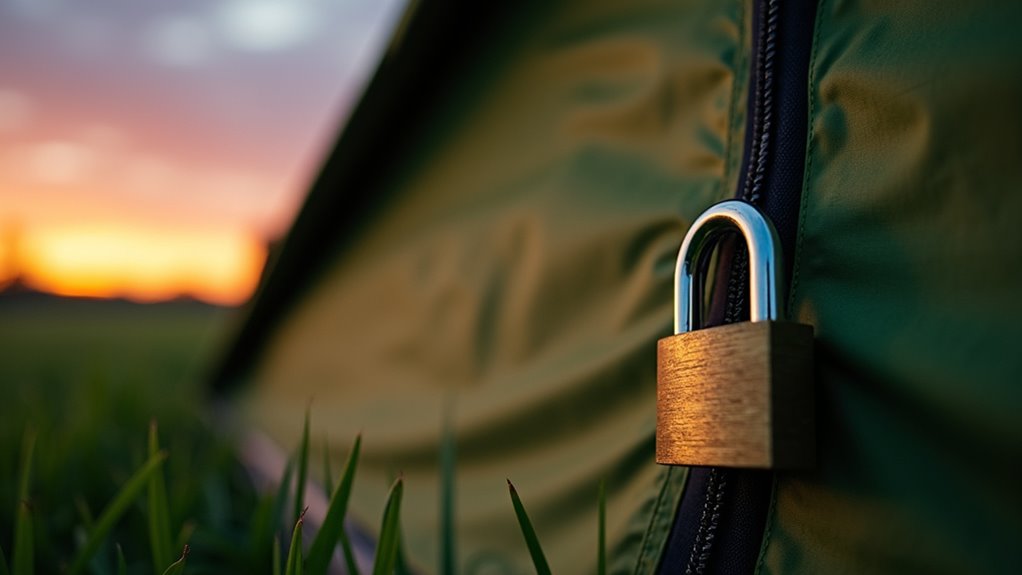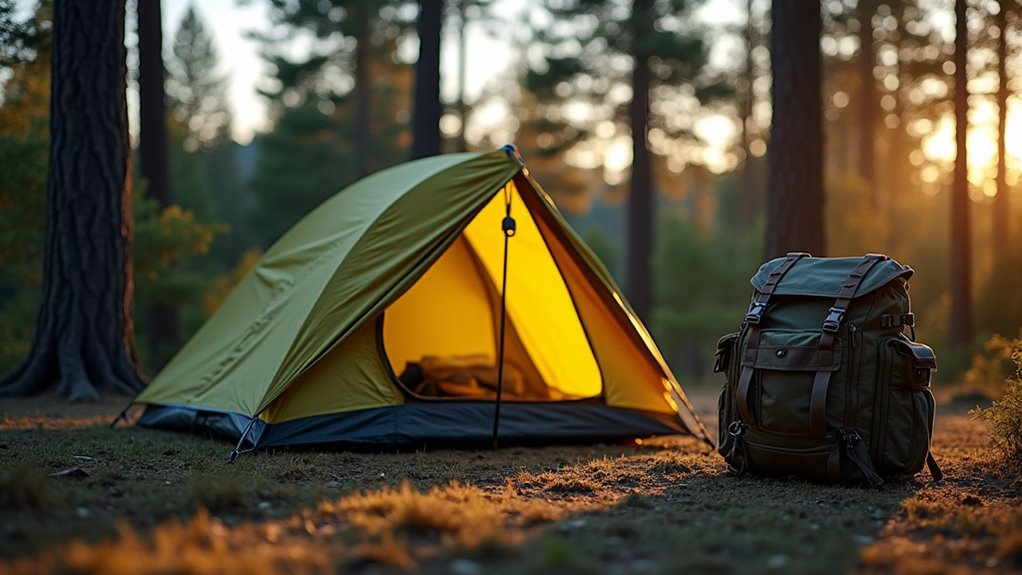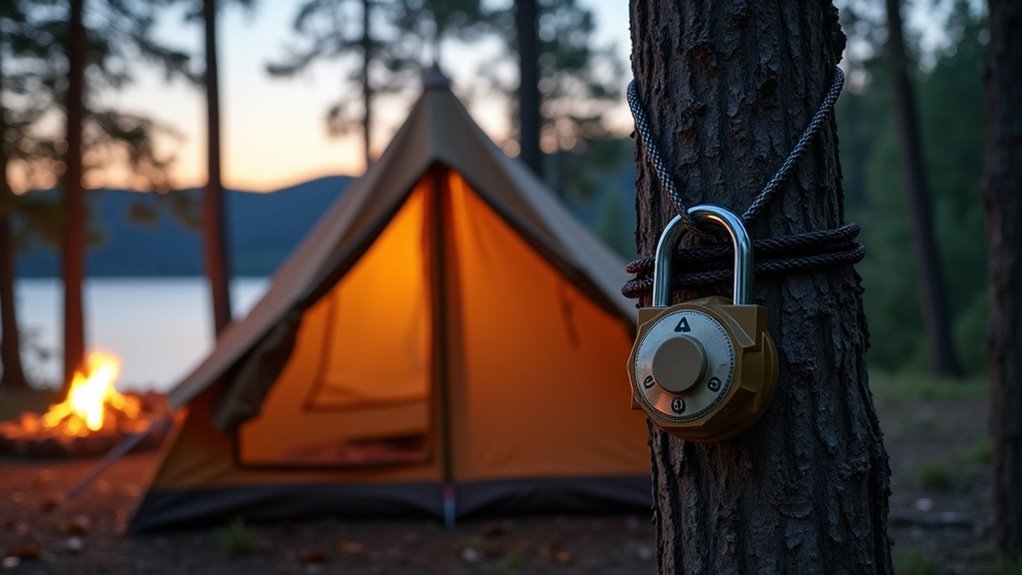How To Lock Tent
This post contains affiliate links. As an Amazon Associate, we earn from qualifying purchases.
To securely lock your tent, use a combination of tent-specific locks and strong cable locks on the zippers and attachment points. For added safety, internal locks and alarm-equipped devices can also be employed. Further explanation and tips on these methods will be provided below to help you protect your tent effectively during your camping adventure.
Essential Facts in 30 Seconds
- Use combination or padlocks on tent zippers to secure openings.
- Use flexible cable locks through zipper loops for added security and internal access.
- Store valuables in lockboxes anchored inside the tent.
- Choose alarm-equipped locks to alert you of tampering.
- Camp in well-lit areas to deter intruders and wildlife.
Types of Tent Locks

Securing your tent is important for a safe camping trip. Different tent locks offer various ways to protect your gear.
Tent padlocks work well by locking zippers or doors through eyelets. They stop people from opening your tent.
Combination tent locks, like Master Lock, use numbers instead of keys. They give easy access but may not stop strong force.
Tent-specific locks fit your tent’s design perfectly. They make it harder for thieves to tamper with your tent.
Cable locks and straps use strong, weatherproof materials. They protect both your tent and extra equipment.
Alarm-equipped locks sound a loud noise if someone tries to open your tent. This alerts you and scares off intruders.
Using the right tent lock keeps your tent safe during outdoor trips.
Effective Locking Methods
Various tent locks improve camping security a lot.
Use flexible cable locks through zipper loops to lock tent doors inside. Tie shoelaces in bows on zipper pulls for quick release in emergencies. Small suitcase-style padlocks work well on zippers; pick ones easy to handle in low light.
Carabiners or twist-and-push clips add extra protection against unwanted entry. Loop strong cable locks around attachment points and zipper pulls to keep them tight. Push locking mechanisms firmly to stop easy opening.
Keep security and quick release balanced for safety while camping.
Additional Security Measures

Boost your tent’s safety with extra steps beyond just locks. Set up portable motion detectors that sound alarms or flash lights when they spot movement. These battery-powered devices are easy to place and help watch your tent from afar.
Keep valuables in small lockboxes inside your tent. Tie these boxes to strong objects like trees to stop thieves.
Use wildlife repellents such as sound makers that turn on with motion or smell-based sprays. Store food and trash far from your tent to avoid attracting animals.
Pick a spot with good lighting to keep your tent visible and less tempting for intruders. Additionally, be aware of the potential presence of animals in the area to prevent dangerous encounters.
Combine these tips to make your tent much safer and more secure.
Safety and Emergency Considerations
Safety matters a lot during camping, especially inside a tent. Start by checking for any risks like bad weather or fire. Mark two clear exits so people can leave fast if needed. Teach everyone how to leave quickly and what alarms sound like.
Keep talking during emergencies. Have a plan to share information fast. Pick a safe spot outside to meet after leaving the tent. Use flashlights or whistles to call for help if trapped or alone. Additionally, ensure proper ventilation when using tent heaters to minimize risks associated with carbon monoxide buildup, as carbon monoxide detectors are recommended for added safety.
Do not go back inside the tent until experts say it’s safe. Check your emergency plans with local safety teams often. Following these steps keeps everyone safer on camping trips.
Best Practices for Choosing a Tent Lock

The right tent lock boosts your camping security.
Pick features that match your needs. Padlocks work well for basic security. Combination locks offer keyless convenience. Check if the lock fits your tent’s zippers or grommets. This prevents fabric damage.
Strong materials matter. Steel cables and hardened metals resist cutting. Cable locks show visible protection and can secure extra gear.
Internal locks add privacy and quick access from inside the tent.
Balance security with ease of use. A good lock protects your tent and peace of mind. Smart choices keep your camping safe and fun.
Frequently Asked Questions
Can I Use a Regular Lock on My Tent Zippers?
Using regular locks on tent zippers can help keep your gear safe. They stop simple tampering and give peace of mind. Pick a lock that fits well to avoid breaking the zipper. Keep in mind, these locks do not stop determined thieves. Always watch your tent area for extra safety.
How Do I Prevent Rust on My Tent Locks?
Prevent rust on your tent locks by cleaning them often. Use a soft cloth to wipe dirt and moisture. Apply a light coat of oil or lubricant to keep locks moving smoothly. Cover locks with a waterproof spray to stop rust from forming. Always dry locks quickly if they get wet. Store your tent in a dry place to avoid dampness. Regular care keeps locks working well and rust-free. Simple steps save you money and trouble later.
What Is the Best Way to Store Tent Locks?
Store tent locks in strong boxes or small containers. Keep them in a cool, dry place to stop rust and damage. Label each box clearly so you find locks quickly. Check locks often for signs of wear or damage. This keeps your gear safe and ready for your next trip. Simple care extends the life of your locks.
Are There Tent Locks Specifically for Children’s Tents?
Tent locks made for children’s tents focus on safety and easy use. These locks often have simple designs like safety pins or small alarms. They keep the tent secure but let kids exit quickly. Parents trust these locks to protect their children while camping or playing. Some locks even help prevent accidental locking inside. Safety and fun go hand in hand with these special tent locks.
How Can I Improve My Tent’s Overall Security?
Think of your tent as a small fortress. Use strong, thick fabric to make it tough. Lock the zippers with small padlocks to stop strangers. Set up your tent near paths or busy spots. This keeps you safe and less visible to thieves. Check your tent often and keep your gear inside. Bright lights or a small alarm can scare away intruders. These easy steps keep your outdoor home secure and peaceful.
Conclusion
Securing your tent keeps you safe during camping. Use strong locks like combination padlocks or cable locks. These stop strangers from entering your shelter. Pick a good spot to set up your tent. Avoid places near roads or busy areas. Use alarms or noise makers to alert you of intruders. Safety is very important. Follow these tips for peace of mind outdoors. Stay alert. Stay safe. Enjoy your camping trip without worries.
